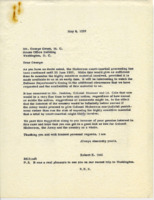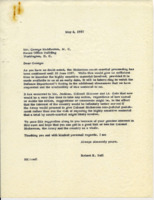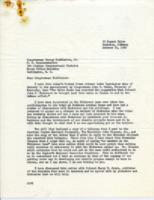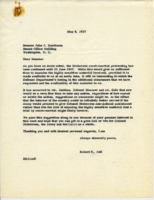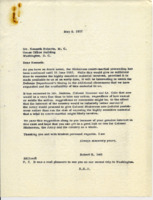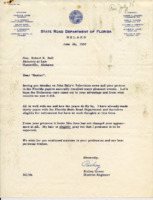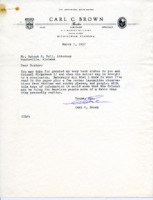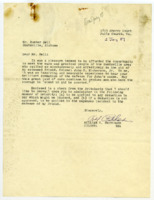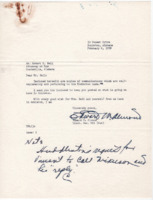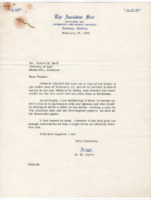
Browse Items (215 total)
Sort by:
-
Correspondence between George Grant and Robert K. Bell.
Bell writes to Grant in Washington D.C. on behalf of the defense counsel in an attempt to change Nickerson's case from trial by court-martial to a non-judicial punishment. Grant responds with interest and states that it looks as though the Army may "drop the Colonel Nickerson case by non-judicial punishment." -
Correspondence between George Huddleston and Robert K. Bell.
Bell writes to Huddleston in Washington D.C. on behalf of the defense counsel in an attempt to change Nickerson's case from trial by court-martial to a non-judicial punishment. Huddleston responds stating his will "make a discreet request" to Secretary Brucker and General Maxwell. -
Correspondence between George Huddleston, Jr., Lieutenant General Edward M. Almond, and Carl Vinson.
Almond writes to Huddleston in an attempt to get Nickerson brought back from exile in Panama. Huddleston agrees with Almond in his response and says he will do his best to advocate for Nickerson's testimony on the missile program and will bring the matter to the attention of the Chairman, Honorable Carl Vinson. Huddleston's following letter of January 25, 1958 states that Carl Vinson does not believe having Nickerson as a witness is advisable. Huddlestone attaches a copy of Vinson's letter that explains this. Almond writes in response to the decision with his thoughts on the matter and believes that "all service officers will step gingerly in their testimony" so as not to "stick their necks out as General Gavin and Colonel Nickerson have already done." -
Correspondence between John J. Sparkman and Robert K. Bell.
Bell writes to Sparkman in Washinton D.C. on behalf of the defense counsel in an attempt to change Nickerson's case from trial by court-martial to a non-judicial punishment. Sparkman thanks Bell for his letter from May 8 and responds that he has already been "dropping some suggestions" regarding Bell's hope to give Nickerson a non-judicial punishment rather than trial by court-martial. -
Correspondence between Kenneth Roberts and Robert K. Bell.
Bell writes to Roberts in Washington D.C. on behalf of the defense counsel in an attempt to change Nickerson's case from trial by court-martial to a non-judicial punishment. Roberts responds that he has done everything he could on the matter. -
Correspondence between Richey Green and Robert K. Bell.
Green writes to Bell saying he saw him on the news following the Nickerson case and he hopes the results were to his satisfaction. Bell writes to Green in response saying he is pleased at the outcome of Nickerson's trial and asks Green to visit him if he is ever in North Alabama. -
Correspondence between Robert K. Bell and Carl C. Brown.
Brown wishes Bell the best in the Nickerson case and expresses support for the Colonel. Bell's response thanks Brown for his support. -
Correspondence between Robert K. Bell and Colonel William C. Pritchard.
Pritchard writes to Bell, sending a check for Colonel Nickerson to be used for any fines that would be imposed or for the expense of the defense of Nickerson. Bell responds with his sincere thanks and writes that he has given the check to Colonel Nickerson. -
Correspondence between Robert K. Bell and Edward M. Almond.
These letters include information pertaining to the Nickerson case. Almond expresses desire to "get something in motion to subdue the unnecessary and trivial expressions of � General Medaris". The letters also mention various correspondence that was included in the exchange of information. Both men advocate for the "cause" of Colonel Nickerson's actions. Bell was Nickerson's attorney during his trial. -
Correspondence between Robert K. Bell and Harry M. Ayers.
In response to Bell's February 13 letter from Edward Almond, Ayers informs Bell that he is attempting to find someone who would write a letter to newspaper publications in agreement with their opinion that Medaris is taking too much credit for his work. Bell responds that he is skeptical Ayers would find anyone as Medaris could make their life a "rather miserable existence".
